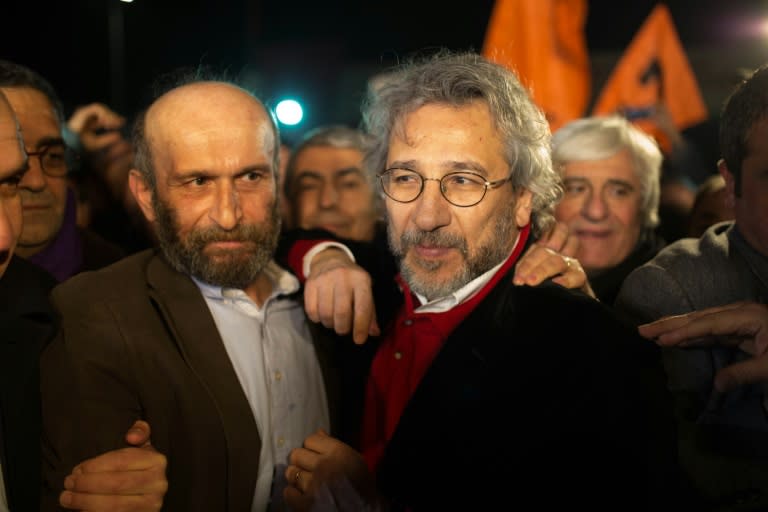Imprisoned Turkish journalists released from jail
Two Turkish journalists held in jail for the last three months on hugely controversial charges of revealing state secrets were released early Friday after Turkey's Constitutional Court ruled their rights had been violated. The Cumhuriyet newspaper's editor-in-chief Can Dundar and Ankara bureau chief Erdem Gul emerged from the Silivri jail on the outskirts of Istanbul before dawn to be greeted by jubilant supporters and family, television pictures showed. They had been detained since November over a report alleging that President Recep Tayyip Erdogan's government tried to ship arms to Islamists in Syria. But the pair, who were kept in jail for 93 days, are still set to stand trial on the charges on March 25, with prosecutors demanding multiple life terms. "I think that this is a very historic ruling," Cumhuriyet quoted Dundar as saying as he left the prison alongside Gul. He noted the irony of being released on February 26, Erdogan's 62nd birthday. "I think it is a nice gift for him. We will continue. We will have nice birthday gifts for him," said Dundar. Dundar said he harboured no anger but would continue to defend rights "with a louder voice", saying 30 colleagues still remained behind bars. "We will continue to fight for press freedom until the concentration camp (Silivri jail) that you see behind us becomes a museum," he added. - 'Campaign on their behalf' - Gul added: "This is not a story of 'I wish I had not done'. It's a story of 'I hope I can continue,'" he added. The Constitutional Court ruled that their "rights to personal liberty and security" and "freedom of expression and freedom of press" had been violated. The decision was approved by 12 members of the court, with three dissenting, Turkish media reports said. The case was then sent back to a lower criminal court, which rubber-stamped the top court's decision, allowing the journalists to walk free. Dundar and Gul were placed under arrest in late November over a report in May that claimed to prove that a consignment of weapons seized at the border in January 2014 was bound for Syria. They have been formally charged with obtaining and revealing state secrets "for espionage purposes" and seeking to "violently" overthrow the Turkish government as well as aiding an "armed terrorist organisation." Both Erdogan and the head of the National Intelligence Organisation (MIT) Hakan Fidan -- the president's hugely powerful but low-profile ally -- are named as plaintiffs in the 473-page indictment. Press freedom group Reporters Without Borders (RSF) said it was "delighted" by the Constitutional Court's decision but warned they still faced trial. "We must all continue to campaign on their behalf. We will not rest until the absurd charges against them have been dropped," RSF secretary-general Christophe Deloire said. The state-run Anatolia news agency said the pair remained under judicial supervision and were banned from leaving the country. However, the ruling by the Constitutional Court could have a major impact on the course of the trial. Presidential spokesman Ibrahim Kalin insisted Friday the court's finding was not tantamount to an "acquittal". "Such espionage cases are happening in other countries in the world," he told reporters in Ankara. He said: "The case will continue and we will closely monitor it." - 'Truth not a crime' - The newspaper report had sparked a furore in Turkey, fuelling speculation about the government's role in the Syrian conflict and its alleged dealings with Islamist rebels in Syria. "The decision by the Constitutional Court says 'it is not a crime to tell truths'," said the head of Turkey's main opposition Republican People's Party (CHP) Kemal Kilicdaroglu. The case has amplified concerns about press freedom under Erdogan, who had personally warned Dundar, Cumhuriyet's chief editor, he would "pay a price" over the front-page story. The prosecutions also added to tensions between Turkey and the European Union (EU), which had warned Ankara it needed to show "full respect" for human rights as part of its bid to join the bloc. US Vice President Joe Biden, on an official visit to Istanbul in January, complained Turkey was not setting a good example on media rights. Turkish Prime Minister Ahmet Davutoglu had himself even expressed disquiet over the journalists' incarceration, saying it would be far better if they were freed pending trial.





